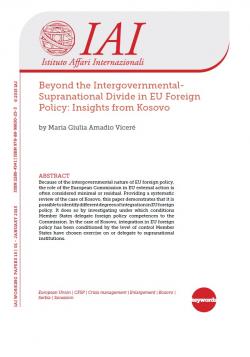Beyond the Intergovernmental-Supranational Divide in EU Foreign Policy: Insights from Kosovo
Because of the intergovernmental nature of EU foreign policy, the role of the European Commission in EU external action is often considered minimal or residual. Providing a systematic review of the case of Kosovo, this paper demonstrates that it is possible to identify different degrees of integration in EU foreign policy. It does so by investigating under which conditions Member States delegate foreign policy competences to the Commission. In the case of Kosovo, integration in EU foreign policy has been conditioned by the level of control Member States have chosen exercise on or delegate to supranational institutions.
-
Details
Roma, Istituto Affari Internazionali, January 2015, 21 p. -
Issue
15|01 -
ISBN/ISSN/DOI:
978-88-98650-25-5
Introduction
1. Integration and the Principal Agent model. Insights on the case of Kosovo
2. From post-conflict reconstruction to European integration: What role for the Commission?
2.1 From post-conflict reconstruction to enlargement
2.2 The declaration of independence and EU-Kosovo relations
2.3 The European Union Rule of Law Mission in Kosovo
3. Delegation of foreign policy competences to the EU in the post-Lisbon era: The 2013 Brussels Agreement
3.1 What basis for negotiation? EU-Kosovo bilateral relations
3.2 EU role in promoting the Belgrade-Pristina talks
3.3 The beginning of the Belgrade-Pristina talks
3.4 More than a name: Kosovo's nameplate in diplomatic meetings
3.5 The 2012 presidential elections
3.6 The Brussels Agreement
Conclusions
References



